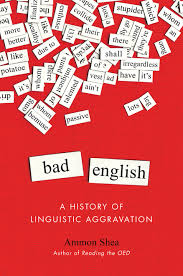“I find the tendency to belittle people for verbal slights to be quite distasteful,” Shea writes. “One of the things that is most curious about people who hold themselves up as language purists is that they seem to spend considerably more time complaining about language than they do celebrating it.” His thesis is that if you go back far enough the word or grammatical error that a purist is complaining about most likely had a different meaning before its current meaning. He has three main ideas: 1) Words can have multiple meanings. 2) Common usage trumps inflexible rules. 3) And the history of the English language is on the side of permissiveness. My favourite section of the book is on Shea’s take on textspeak: “Complaining about young people’s linguistic proclivities is about as predictable as predictable as complaining about their music. The first recorded use to date of OMG is from 1917.” In 1887 there was a suggestion to use type written marks to convey emotions. Vladimir Nabokov said that he often thought “there should exist a special typographical sign for a smile.
Well written and quite funny, I found it to be an enjoyable read.
You can use funner and funnest, but you should bear in mind that anyone who chastises you for this use is unlikely to be interested in hearing your explanation for why it should be acceptable. These words will grate on the ears of many for some while to come.


Ha! I love the last paragraph of your review. I have to admit that I sometimes like to make up words and use them as though they are real. Maybe this would be a good book for me.
I do think you will like it Naomi. Despite being erudite it is still funny. My wife is reading it now and keeps remarking how funny it is.